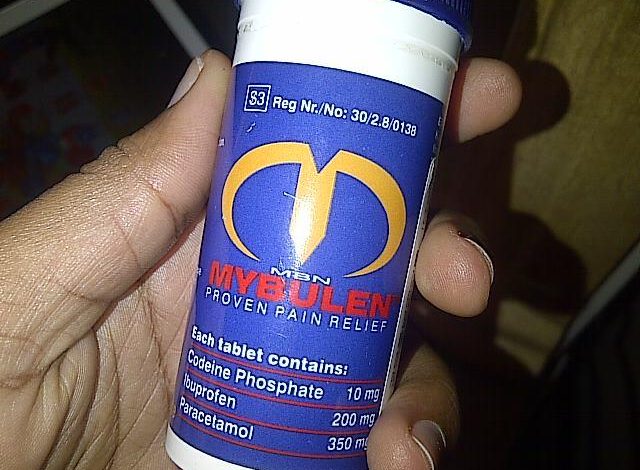Is Mybulen A Dangerous Drug?

Mybulen tablet is a pain medication used for the relief of mild to moderate pain of inflammatory origin with or without fever. Contains active ingredients including Ibuprofen, Codeine phosphate, and Paracetamol.
Each mybulen tablet contains:
- Paracetamol (350mg)
- Ibuprofen (200mg)
- Codeine Phosphate (10mg).
Mybulen tablets are very popular pain management pill in Southern Africa but the challenge of pain management is an enormous problem globally. Different pain conditions show different patterns of pain throughout the day. Morning pain is found in people with inflammatory conditions, including migraine, rheumatoid arthritis, and toothache. But people experiencing neuropathic pain, as in postherpetic neuralgia, diabetic neuropathy, or cancer are more likely to have worse pain in the evening or at night. Pain at night can also disrupt sleep, which may make the pain worse.
Estimates suggest that 20% of adults suffer from pain globally and 10% are newly diagnosed with chronic pain each year. Nevertheless, the problem of pain has primarily been regarded as a medical problem.
Is Mybulen a dangerous drug?
Mybulen is considered a safe medication to use. However, Mybulen can be a dangerous drug when used outside prescribed parameters. Each tablet of Mybulen contains 350mg of Paracetamol, a medication that has a narrow window of safety. Taking too much paracetamol can damage the liver, sometimes leading to a liver transplant or death.
The body breaks down most of the paracetamol in a normal dose and eliminates it in the urine. But some of the drug is converted into a byproduct that is toxic to the liver. If you take too much—all at once or over a period of days—more toxins can build up to a level your body cannot handle.
For the average healthy adult, the generally recommended maximum daily dose is no more than 4,000 milligrams (mg) from all sources. But in some people, doses close to the 4,000 mg daily limit for adults could still be toxic to the liver. It’s safest to take only what you need and to not exceed 3,000 mg a day whenever possible, especially if you use paracetamol often.
In addition, Mybulen also contains Codeine Phosphate, a drug with a risk for abuse and addiction. Codeine may cause severe, possibly fatal, breathing problems, overdose, and death.
Prolonged use of Mybulen is dangerous because once a user becomes tolerant of the codeine component of the drug, they will require more of it to achieve the previous high. In cases of prolonged use, the drug is needed just to feel normal. Addiction may exacerbate an abuser’s fear of coping with day-to-day tasks without Mybulen.
Taking too much of Mybulen tablets can result in an ibuprofen overdose also. This can cause dangerous side effects such as damage to your stomach or intestines. In rare cases, an overdose can be fatal. For this reason, you should always take Mybulen tablets exactly as directed on the label or as recommended by your doctor.





